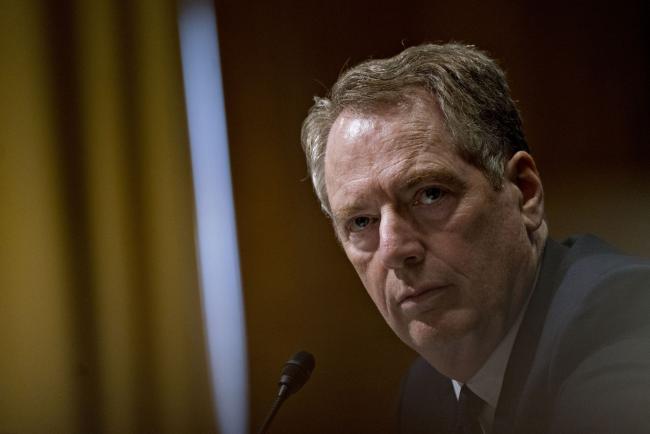(Bloomberg) -- Want to receive this post in your inbox every day? Sign up for the Terms of Trade newsletter, and follow Bloomberg Economics on Twitter for more.
Welcome to December. And let’s just go ahead and call it Bob Lighthizer Month.
In the coming weeks no single economic policy maker is going to have a bigger hand in shaping the future of the global economy and its governance than President Donald Trump’s trade czar. There are four things unfolding to make that so, even if all of them could still end up going in very different directions.
- There are effectively 13 days left for Lighthizer and his Chinese counterpart, Vice Premier Liu He, to nail down the details of a partial deal to avoid another escalation in a trade war between the world’s two largest economies. If they don’t do so by Dec. 15, Trump has threatened another wave of tariffs that will hit the supply chains of consumer favorites like smartphones, laptops and toys. A deal in itself may be more temporary truce than transformative treaty. But the lack of an agreement would undoubtedly roil markets and both intensify and extend the growth-sapping uncertainty that has plagued the U.S. and global economies in 2019. It would also do so as Trump enters the 2020 election year. Stay tuned.
- The one legislative win Trump is hoping for before the end of the year is the passage through Congress of his renegotiated Nafta. The U.S.-Mexico-Canada Agreement borrows heavily on the old Nafta and the Trans-Pacific Partnership negotiated by the Obama administration. It does have some important tweaks including new auto content rules designed to encourage more production in the U.S. that appeal more to Democrats in Congress than Republicans. Those are Lighthizer’s changes. Together with his careful and patient cultivation of senior Democrats led by Nancy Pelosi, they are also the only reason the USMCA has a chance of passing the House of Representatives this month. Even with impeachment afoot and a president lobbing social-media insults at the very people whose votes he needs.
- Lighthizer is the master of the engineered crisis as leverage. Nowhere is that more evident than at the World Trade Organization, where he wants change. Come Dec. 10 the WTO’s seven-seat appellate body will be down to just one tenured member — paralyzed by a U.S. blockade of new panelists. After years of watching the trade arbiter reject the very U.S. anti-dumping methods on which he made his fortune, Lighthizer is exacting his revenge at a cost to a system that many other countries want to preserve.
- On Monday Lighthizer’s office will issue the findings of an investigation into France’s digital services tax. It could serve as justification for another round of trans-Atlantic tariffs and provide more evidence for the slide into trade unilateralism that Lighthizer has overseen. Another administration might have challenged the tax at the WTO. Trump and Lighthizer much prefer being the plaintiff, prosecutor, judge and jury all in one. Though perhaps with justification in this case. The French tax is targeted at American tech giants like Amazon (NASDAQ:AMZN), Facebook (NASDAQ:FB) and Google (NASDAQ:GOOGL). It also already is being replicated elsewhere. For the U.S., waiting the years it takes for WTO cases to play out seems an unacceptable option. Better to apply your own pressure for change. Especially when you’ve put the future of the WTO’s judiciary in doubt.
Peter Navarro, one of Trump’s most hawkish trade advisers, says he thinks he has a winning formula for overhauling the institutions that are the pillars of the global economy’s multilateral order. It revolves around his recent win at a little-known organization in Geneva called the the Universal Postal Union.
Today’s Must Reads
- Steel reversal | Trump said he’s restore tariffs on all steel and aluminum shipped into the U.S. from Brazil and Argentina, citing a “massive devaluation” of their currencies.
- Beijing’s response | China avoided measures related to trade in its first actions retaliating against the U.S. over a law supporting Hong Kong’s protesters.
- Western spaghetti | Italy can’t abandon the North American wheat used to make pasta after smaller plantings and foul weather curbed European output.
- Hungry for palm | India is considering imposing new restrictions on refined palm oil imports to curb purchases and boost the local edible oil industry, a move that may help the government fulfill its aim to double farmers’ incomes by 2022.
- Thai breaker | EU producers of sweet corn won five more years of tariffs against Thai competitors as the bloc prolonged trade protection more than a decade old.
- Soft November | There’s more weakness than meets the eye in China’s Caixin PMI.
- Korean exports | A steep drop in South Korean trade reflects more fallout from the U.S.-China trade war.
- Dec. 5: U.S. trade balance
- Dec. 6: France trade balance
- Dec. 8: China trade balance
- Dec. 9: Germany trade balance
Don’t keep it to yourself. Colleagues and friends can sign up here. We also publish Balance of Power, a daily briefing on the latest in global politics.
For even more: Subscribe to Bloomberg All Access for full global news coverage and two in-depth daily newsletters, The Bloomberg Open and The Bloomberg Close.
How are we doing? We want to hear what you think about this newsletter. Let our trade tsar know.
